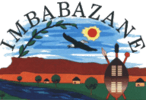Imbabazane Local Municipality
| Imbabazane | ||
|---|---|---|
| Local municipality | ||
| ||
.svg.png) Location in KwaZulu-Natal | ||
| Coordinates: 29°00′S 29°53′E / 29.000°S 29.883°ECoordinates: 29°00′S 29°53′E / 29.000°S 29.883°E | ||
| Country | South Africa | |
| Province | KwaZulu-Natal | |
| District | uThukela | |
| Seat | Ntabamhlophe, Estcourt | |
| Wards | 13 | |
| Government[1] | ||
| • Type | Municipal council | |
| • Mayor | Hlanganani Dlamini | |
| Area | ||
| • Total | 1,426 km2 (551 sq mi) | |
| Population (2011)[2] | ||
| • Total | 113,073 | |
| • Density | 79/km2 (210/sq mi) | |
| Racial makeup (2011)[2] | ||
| • Black African | 99.5% | |
| • Coloured | 0.1% | |
| • Indian/Asian | 0.1% | |
| • White | 0.2% | |
| First languages (2011)[3] | ||
| • Zulu | 95.4% | |
| • English | 1.5% | |
| • Southern Ndebele | 1.2% | |
| • Other | 1.9% | |
| Time zone | SAST (UTC+2) | |
| Municipal code | KZN236 | |
Imbabazane Local Municipality was an administrative area in the Uthukela District of KwaZulu-Natal in South Africa. Imbabazane is the name of an African tree.[4] After municipal elections on 3 August 2016 it was merged into the larger Inkosi Langalibalele Local Municipality.
Main places
The 2001 census divided the municipality into the following main places:[5]
| Place | Code | Area (km2) | Population |
|---|---|---|---|
| Abambo | 51801 | 45.88 | 9,554 |
| Amangwe | 51802 | 285.43 | 43,535 |
| Dlamini | 51803 | 25.29 | 3,983 |
| Estcourt | 51804 | 66.27 | 11,772 |
| Hlubi | 51805 | 29.71 | 4,697 |
| Mabaso | 51807 | 46.71 | 15,849 |
| Mhlungwini | 51808 | 59.10 | 22,274 |
| Zwelisha | 51809 | 9.79 | 7,211 |
| Remainder of the municipality | 51806 | 284.42 | 1,067 |
Politics
The municipal council consists of twenty-five members elected by mixed-member proportional representation. Thirteen councillors are elected by first-past-the-post voting in thirteen wards, while the remaining twelve are chosen from party lists so that the total number of party representatives is proportional to the number of votes received. In the election of 18 May 2011 no party obtained a majority; the African National Congress won twelve seats, the National Freedom Party seven, and the Inkatha Freedom Party five. The ANC and NFP formed a coalition to govern the municipality. The following table shows the results of the election.[6][7]
| Party | Votes | Seats | ||||||
|---|---|---|---|---|---|---|---|---|
| Ward | List | Total | % | Ward | List | Total | ||
| African National Congress | 14,823 | 15,135 | 29,958 | 49.2 | 11 | 1 | 12 | |
| National Freedom Party | 8,435 | 8,084 | 16,519 | 27.2 | 1 | 6 | 7 | |
| Inkatha Freedom Party | 6,498 | 6,749 | 13,247 | 21.8 | 1 | 4 | 5 | |
| Democratic Alliance | 586 | 524 | 1,110 | 1.8 | 0 | 1 | 1 | |
| Total | 30,342 | 30,492 | 60,834 | 100.0 | 13 | 12 | 25 | |
| Spoilt votes | 841 | 714 | 1,555 | |||||
References
- ↑ "Contact list: Executive Mayors". Government Communication & Information System. Retrieved 22 February 2012.
- 1 2 "Statistics by place". Statistics South Africa. Retrieved 27 September 2015.
- ↑ "Statistics by place". Statistics South Africa. Retrieved 27 September 2015.
- ↑ South African Languages - Place names
- ↑ Lookup Tables - Statistics South Africa
- ↑ "Results Summary – All Ballots: Imbabazane" (PDF). Independent Electoral Commission. Retrieved 3 December 2013.
- ↑ "Seat Calculation Detail: Imbabazane" (PDF). Independent Electoral Commission. Retrieved 3 December 2013.

.svg.png)